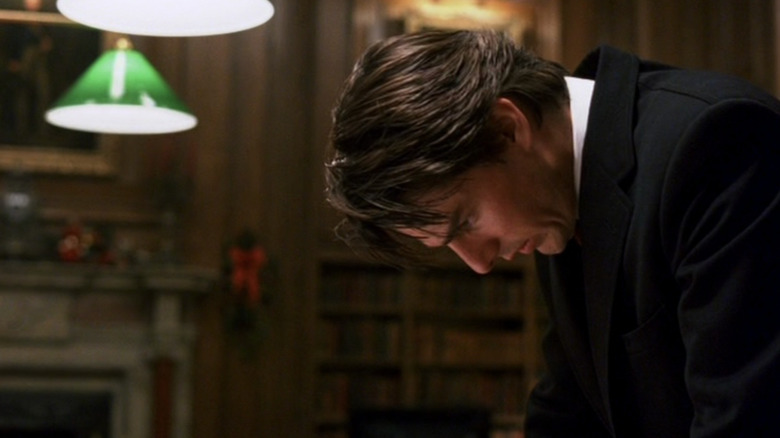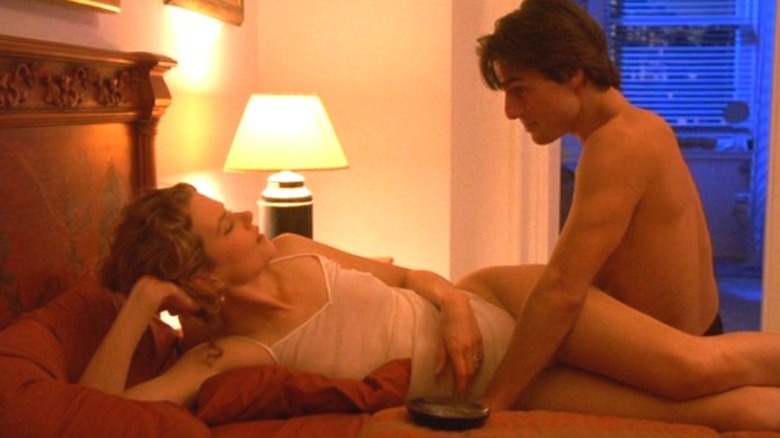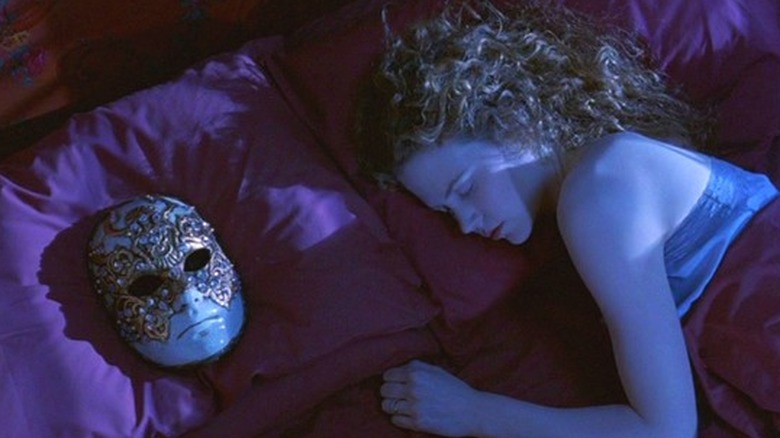Stanley Kubrick Had Tom Cruise Flying Blind While Filming Eyes Wide Shut
It's hard to reckon with a filmmaker such as Stanley Kubrick when he's created art so deserving of critical acclaim, but the grandeur is clouded by how incredibly difficult, obsessive, and manipulative his behavior was on set. Films like "A Clockwork Orange" and "Eyes Wide Shut" had audiences everywhere figuratively by the throats, earning decades of dedicated viewership. However, do the ends of epic filmmaking justify the means when compromising the mental well-being of the team you've hired to bring your vision to life? Probably not. And yet, in a 2014 Vanity Fair article, Amy Nicholson recalls the ways in which "Eyes Wide Shut" stars Tom Cruise and Nicole Kidman leaned into the tactics Kubrick was implementing, appreciating how the director was able to create such a vision through psychoanalyzing and manipulating his actors' real lives.
For the then-married couple, working on "Eyes Wide Shut" was an endurance test, twisting the knife into their greatest fears and insecurities, and using those as fixtures in the story. The two ended up divorcing shortly after the film premiered.
Cruise, who holds the most screentime throughout the film and still advocates for Kubrick's tactics over 23 years later, was barred from seeing any of his performances as the project was being shot. "Making a movie is like stabbing in the dark," Cruise explained. "If I get a sense of the overall picture, then I'm better for the film." But Cruise couldn't get an overall picture, which means he couldn't adjust his performance and maintain control of his character. He had to be himself.
A specific set of rules
In a 2004 interview on "Inside the Actor's Studio," Cruise stated that when going into a role, he builds a story around a character, creating a whole new persona around his role and constructing the psyche of the subject he's trying to play. It becomes a method acting practice, requiring full dedication to portraying actions, thoughts, and mannerisms of someone who he isn't. For Kubrick to demand that the couple essentially embody themselves, Cruise had to abandon his acting approach and lean into the personal spontaneity of portraying his own marital troubles, doubts, and fears on camera.
Working on "Eyes Wide Shut," Stanley Kubrick devised a specific set of rules for Nicole Kidman and Tom Cruise to stick to, aiming to bring alienation and hostility into their relationship both on and off-screen. He acted as a therapist for the couple, prying out their individual fantasies and concerns, and built the narrative off of that. He kept the couple isolated from one another when possible, directing them completely separately, and forbidding them from sharing acting notes with one another. His most controversial move was asking Kidman to shoot six straight days of sex scenes in over 50 sexual positions with her on-screen paramour, and then refusing to let her share or reflect on any of the processes with her then-husband.
No stranger to psychological damage
You can't reference the director's behavior without paying respect to Shelley Duval. When "The Shining" came out — 19 years prior to "Eyes Wide Shut" — Stanley Kubrick was polishing up his bag of aggressive directing tactics on Duval, who eventually had a nervous breakdown. He not-so-tacitly demanded that Shelley remain in a consistent trauma response for her scenes with the murderous Jack Nicholson. Yes, the performance is exemplary, but not at the expense of Shelley Duval's well-being.
Kubrick was also infamous for his perfectionism and secrecy when working on set. "Eyes Wide Shut" was initially supposed to take six months to film but ended up setting the Guinness World Record for the longest constant film shoot, which can be attributed to the director's obsessive nature. Harvey Keitel was originally slated to play tycoon Victor Ziegler in the film, but the role was then given to Syndey Pollack as Keitel couldn't keep extending his time for this seemingly neverending project. To top it off, the time commitment that Kubrick required of his cast wasn't compensated to the degree others would consider "fair."
In an interview with Far Out Magazine, actor Gary Oldman recounts how when he heard about Keitel's experience on set, he decided that was enough to keep him from wanting to work with the legendary director. "He would just say 'do it again,'" he continued. "I don't know whether he was looking for something very specific and he wasn't going to tell you? I mean I love Kubrick's films, but I don't know how I would've worked with that."


